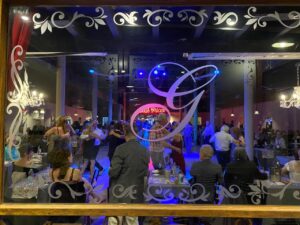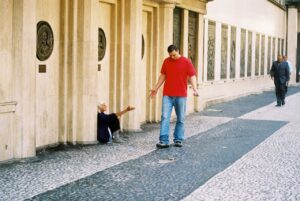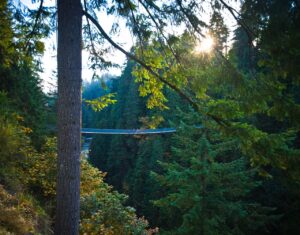As part of our series finding out about past members, Corky Gormly interviewed ex-ICG member and former egroup moderator Ben Lovejoy. Their discussion covered Apple blogs, novels and the Argentine tango. This is the transcript of her interview Thanks Corky and Ben – a really interesting read!
CG – Ben Lovejoy, you’re a very talented man – business owner, fabulous photographer, technology writer, and a successful fiction author turning your hand to a range of genres – technology thrillers, a romcom novel and a science fiction novella series … please tell us about yourself and what drives you.
BL – That’s a big question! I’m insatiably curious, which I guess is what attracted me to research. I love to understand the how and the why of things. I also find myself somewhat less interested in a topic once I do understand it to my own satisfaction, which explains my portfolio career.
CG – What on earth made you get into market research?
BL – That is a very long story – but the short answer is that I fell into it completely accidentally, and it seemed tailor-made for me. As a tech researcher, I got to play with gadgets, and ask people lots of questions about themselves: about their use of tech, how they chose their devices, what they loved and hated, what they wish existed. For someone driven largely by understanding things, and with a love of gadgets, it kept me enthralled for many years!
CG – What led you to want to set up your own agency – Plug & Play?
BL – That had actually always been my plan. I was working for RDSi, the international wing of a small-ish qual agency with a fabulous team of people. I thought I’d stay there for a few years, and then set up on my own. Then TNS (as was) headhunted me. I kept saying no, and they kept calling back, and finally they pretty much let me design my own job – and the team I joined was a great one – so I took it.
I thought I’d stay for a couple of years, but being there did create a lot of opportunities. However, things changed a lot. I think in the seven years I was there, I had eight divisional managing directors, and the autonomy I had at the beginning was gradually whittled away.
I’d established a particularly strong relationship with one client, and was doing back-to-back projects for them. Although they had a contract with TNS, I was pretty sure they would want me to continue running their projects after I left, and happily that was indeed the case.
CG – Tell me about the role the ICG played for you?
BL – The biggest downside of setting up on my own was that I no longer had a team, or a network. I mean, as all my research was international, I of course had the overseas agencies I worked with, and I established great relationships with individual researchers within those with whom I worked on project after project. But for me the ICG provided two key things.
First, a network of colleagues who could collectively answer any question, or provide any resource, any researcher could possibly need! Despite having worked for one of the largest research agencies in the world, I’d say that the ICG was a better network that I had there.
Second, the egroup was also the equivalent of the water-cooler in the office – a place to just chat and catch up with people and have all kinds of fascinating conversations!
CG – You were our egroup moderator for a while too weren’t you?
BL – I was, for most of my time there. I managed to successfully avoid committee meetings, though! No offence at all to my delightful ICG colleagues, but I had years of being on committees, and had vowed never again!
CG – What do you miss most about no longer being a member?
BL – It’s the community, for sure. The egroup and the social get-togethers.
CG – You said research was almost tailor-made for you – what led you to move on?
BL – It was a combination of things. I think most ICGers will relate to the fact that it’s almost physically impossible to turn down work. Add in the fact that all my work was international, and there were long periods when I was out of the country more than I was at home, and where I was working 12+ hour days, six days a week. That just wasn’t sustainable, and it reached the point where I felt like I never wanted to see another airport or hotel in my life.
Then the recession hit, and it gave me an opportunity to take stock. The crazy workload had enabled me to pay off my mortgage early, and I realized that my income needs were dramatically lower.
I’d started out in life as a writer on a computer magazine, then a freelance writer. That didn’t pay enough to give me the lifestyle I had as a researcher, and indeed writers are even more badly paid now than when I last did it. But I did the sums, figured out that without a mortgage it was affordable, so I decided to put quality of life over money, and return to writing.
I now work about five hours a day, doing work I can do from anywhere in the world, so there’s a huge amount of freedom in that. The ‘never wanting to see an airport again in my life’ phase did eventually wear off! I dance Argentine tango, and back in March spent a month in Buenos Aires, working in the morning, dancing in the afternoons and evenings. I love my life!
CG – Argentine tango? Tell us about that!
BL – It was, as with most wonderful things in life, a complete accident. My then-girlfriend introduced me to it, and it’s a massive trap for anyone driven to understand how things work!
It’s a partner dance, but there are no fixed steps – all movements are improvised on the fly, yet two people can dance those movements in perfect synchronization. It’s a lifelong learning project. I became completely obsessed for about the first two years, dancing four or five evenings a week. I did eventually settle down, and now dance once or twice a week, but it’s still a huge passion.
Buenos Aires is a mecca for tango dancers, and after one two-week visit, I knew I had to come for longer. I found an apartment, and some friends who wanted to join me, and had an amazing time. I’m doing the same thing next March.
(Here’s a link to Ben’s video of his last trip there, and one of his photos below)

CG – Do you have any regrets about having made the move away from research and insight?
BL – No. I mean, I still think qual is a fantastic job, and if anyone is interested in it, I wouldn’t hesitate to recommend it. I would, though, advise staying away from international research!
CG – Do you miss anything about it?
BL – Yes. I did love getting paid to satisfy my curiosity; I loved the people; it was a life that had a great many upsides. But I wouldn’t ever go back.
CG – What type of writing are you doing?
BL – It’s a very different world to the one I left in the 1990s! Then it was newspapers and magazines, now it’s mostly websites. I write for 9to5Mac, an Apple-focused website, and that’s kind of like the ICG all over again – we have a Slack chatroom for the writers and editors, and it’s a fantastic team. I again feel part of a community, despite spending my working hours sat alone at my desk at home.
I’ve written some fiction, but although one novel proved surprisingly successful, I wrote those for fun.
CG – What do you have planned for the future?
BL – I’ve recently got into filmmaking, which has taken over from recreational writing. I’ve made two micro-short films so far, and my next project is a micro-documentary about tango.
CG – How can interested ICG members follow what you’re up to?
BL – You can find my Apple-focused work at 9to5mac.com, and my films/videos at benlovejoy.art. If you are way more interested in tango than any sane person would be, I also have a tango blog. Oh, and if you want to know how I remained sane during lockdown, I got up uncharacteristically early and cycled around the empty city: londonwithoutpeople.com.
CG – Which one of your books would you recommend people to try first?
BL – Probably The Billion Dollar Heist: https://www.amazon.co.uk/Techno-thriller-Billion-Dollar-Heist-ebook/dp/B00ZPMNTYC/
I think you have to like tech to enjoy either this or 11/9, but the BDH isn’t *quite* so geeky!
CG – Finally, for those of us who are aspiring authors, (and we do have some in the ICG), or who may be in the future, can you give us any advice about writing, finding a publisher, self-publishing or approaching literary agents?
The best bet is to join a writing group. There you’ll meet fellow writers, be able to compare notes, and learn about ways to meet editors and agents informally. Write Together was the one I joined (and ran for a time).
Interviewed by Corky Gormly August 2022.
Here is a selection of some photos from Ben from his time as a globe-trotting researcher and after.










